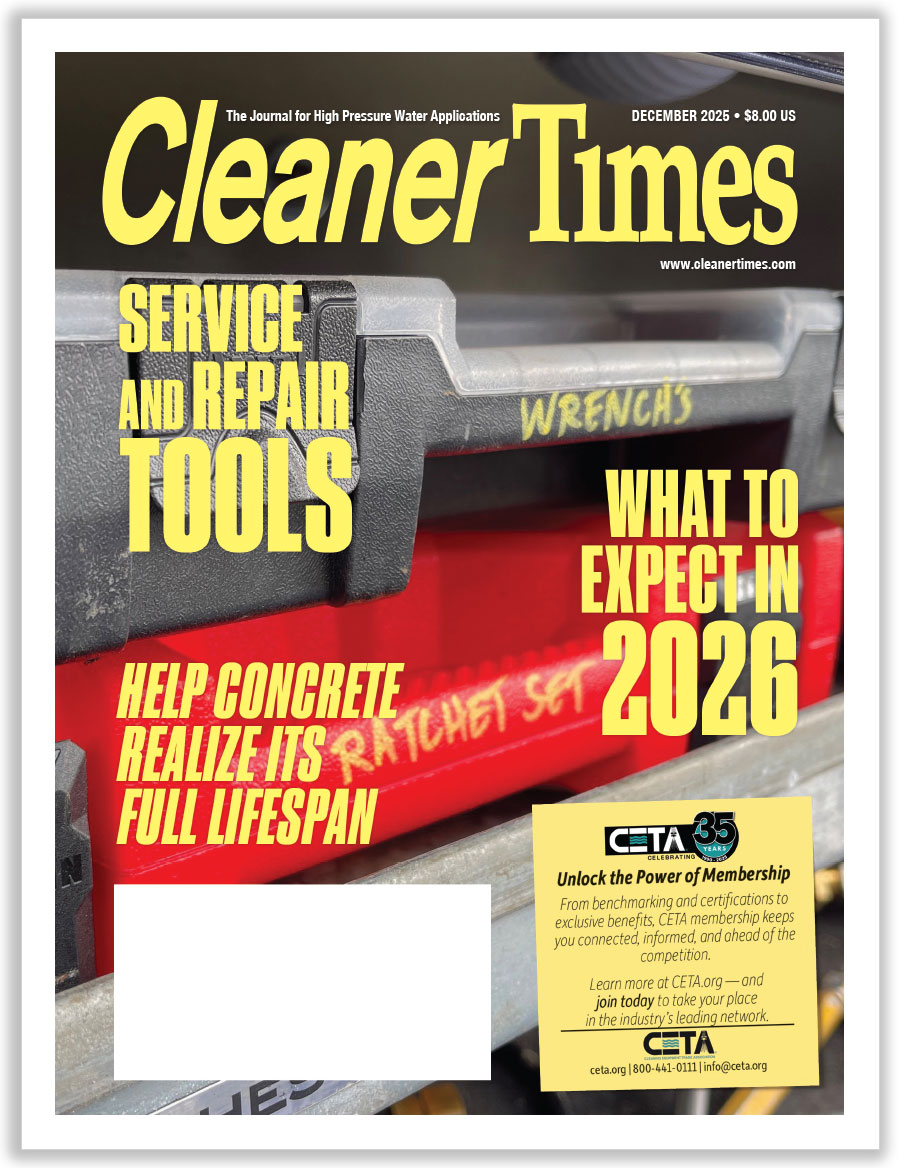
CETA Edge
Technical Updates—Q&A with Jimmy Welch
By Diane M. Calabrese / Published November 2021

There’s nothing like being able to sit down with a technical expert in a subject and ask him a few questions. It’s a way to not only get a bit of amplification on the facts, but also to just get a few of the “I wonder why” and “What’s next” queries answered.
CETA members know well the updates and in-depth information they can tap thanks to the efforts of the association’s technical committee. (See https://ceta.org/technical.) Jimmy Welch with American Pressure Inc. in Robbinsdale, MN, heads the committee.
We had the opportunity to put some questions to Welch. His answers provide a great overview of technical updates, and a significant illustration of the robust information available from CETA, the Cleaning Equipment Trade Association.
UL 1776 TO UL 60335-2-79 Transition
Q: UL canceled the long-anticipated effective date (which was to be March 21, 2021) for transition from UL 1776 to UL 60335-2-79. Why was the effective date canceled?
Welch: In meetings of the CETA-sponsored THC 335H, the Technical Harmonization Committee, which has several manufacturers who have products third-party-tested to UL 1776, it became clear there were only a few that had completed UL 60335-2-79 requirements. So the extension was requested and granted.
The 60335-2-79 has some new requirements, like the 96-hour endurance testing. Third parties include UL, CSA, ETL, or a nationally recognized testing laboratory (NRTL).
Q: Was the cancellation a surprise?
Welch: Yes and no. Manufacturers had been given five years to get the products they have with UL 1776 to UL 60335-2-79. But this is an expense that many had not invested in mainly because of the additional cost of the 96-hour endurance test. Many chose UL 1776 on existing products. However, the few that did choose to complete their UL 60335-2-79 did so with newer products.
Q: What kind of impact does the cancellation have on the industry?
Welch: There is no real change as the cancellation of the transition still allows manufacturers to use UL 1776 or UL 60335-2-79.
Q: The statement at the CETA website indicates the UL received “no negative responses” to the prospect of cancellation and thus went forward with it.
Welch: Correct, no negative responses.
Q: No negative responses—how can that be explained?
Welch: Many products that are UL 1776 exist today with good, safe performance. There are only a few changes in UL 60335-2-79 which do enhance the product safety, but everyone understood that more time is needed to complete the update.
Q: When do you anticipate the transition will take place?
Welch: Once manufacturers working with third-party testing laboratories can complete the transition to UL 60335-2-79. Many manufacturers may choose to wait until the THC 335H completes the current binational work being done between UL and CSA.
THC 335H is currently working on the harmonization of UL 1776, UL 60335-2-79, CAN/CSA C22.2 No. 68, CAN/CSA B140.11, and CAN/CSA E60335-2-79 to complete UL/CSA 60335-2-79, which is Particular Requirements for High Pressure Cleaners and Steam Cleaners.
The committee is also currently revising or updating UL 1776 to the newest NEC/NFPA requirements for GFCIs.
CPC-100 Performance Standard
Q: The CETA CPC-100 performance standard is fully described at the CETA website. Is there information from the 12-page detailed description of the standard there and its criteria that you would like to highlight?
Welch: The rating of maximum pressure is noteworthy. It is obtained from a pressure washer in continuous operation during which time the following performance data are recorded at five-minute intervals: Six pressure values from a pressure gauge located at the pump manifold, as well as flow; the maximum working pressure will be the average of these values.
For advertising purposes, the maximum pressure a machine can be rated is 10 percent more than the calculated average. Or, if some prefer, the actual measured pressure and flow must be 90 percent of advertised flow.
If you are wondering about not only the details of CETA CPC-100 but also how it compares with PWMA (Pressure Washer Manufacturers’ Association) standard for pressure washers, see the side-by-side comparison provided by CETA via https://ceta.org/cpc-100-performance-standard. One significant difference, which anyone who drives a car should appreciate, is that the CETA CPC-100 standard acknowledges an engine should not need to run full out—at maximum rpm—to achieve the maximum pressure; indeed, the standard requires a 15 percent reserve. That requirement is a nod to supporting engine longevity, making the certification particularly valuable to end users.
Q: Why is it important for CETA to have its own standard?
Welch: As the industry’s trade association, CETA is at the forefront of working with our members. A unified way of testing the product is necessary so current as well as future manufacturers have a detailed performance standard, and distributors know they are selling a quality product that performs as it should when they sell to their customers.
EPA and CARB Emission Compliance
Q: Can you give an example of other significant issues the technical committee is monitoring?
Welch: Emission compliance to EPA and CARB [California Air Resources Board] is again becoming a concern to our industry. For example, members of our industry who sell equipment in California must meet CARB requirements.
The current California AB-1346 Air Pollution for small off-road engines (SORE, which are spark-ignition engines rated at or below 19 kilowatts), which includes pressure washers, states, “The Governor’s Executive Order No. N-79-20 of September 23, 2020, directs the state board to implement strategies to achieve 100 percent zero emissions from off-road equipment in California by 2035, where feasible and cost-effective. The state will not achieve that goal without further regulation of SORE, including a mandate to transition all sales of new equipment to zero-emission equipment.” And “the state board shall, consistent with federal law, adopt cost-effective and technologically feasible regulations to prohibit engine exhaust and evaporative emissions from new small off-road engines, as defined by the state board. Those regulations shall apply to engines produced on or after January 1, 2024, or as soon as the state board determines is feasible, whichever is later.”
[For readers who believe it’s a stretch to imagine pressure washer engines soon will be encompassed by SORE, consider that section 43018.11 of CARB proposes to encompass “both commercial and residential lawn and garden users” of engines—yes, even lawnmowers.]
Q: Anything to add in this short Q and A?
Welch: It would be good to recognize the THC 335H members, whom I am honored to serve with and chair. They are Brian Burnelli (Briggs & Stratton Corporation), Darrin Conlon (Under-writers Laboratories Inc.), Mike Conway (Southwire Company, LLC), Allieter Denyer (Easy Kleen), Michael Dums (Intertek Testing Services N.A.), John Evans C.E.T. (Stanley Black & Decker Canada), Marvin Evans (CSA Group), Charalambos Freed (Nilfisk, Inc.), Jay Halloway (Alkota Cleaning System Inc.), Preben Hosbond (Nilfisk, Inc.), Annie Marie Jacobs (Underwriters Laboratories Inc.), Frederik King (EU-united), Volker Koenig (Andreas Stihl), Hamid Lakzadeh (BE Power Equipment), Pierre Legault (B140 TC member), Leonard Letea (CSA Group), Tan Lu (CSA Group), Barry Milstead (Tower Manufacturing Corporation), Joe Musso (Underwriters Laboratories Inc.), Karl Pasternak (Dynablast), Daniel Pearson (Kärcher North America), Mike Priest (Easy Kleen), Steffen Reiser (Alfred Kärcher GmbH & Co. KG), Hassan Shah (Dynablast), Bryson Sharp (Northern Tool + Equipment), Mikhail Sher (Nilfisk, Inc.), Charles Tibboles (R.W. Beckett Corp.), Daniel Tyndall (epps Products), Brad Van Otterloo (Mi-T-M Corporation), Mark Wegner (Sioux Steam Cleaner Corporation), and Kenneth Wills, technical secretary (CETA).
Not yet taking advantage of all CETA offers? Why not join now? Contact info@ceta.org.





